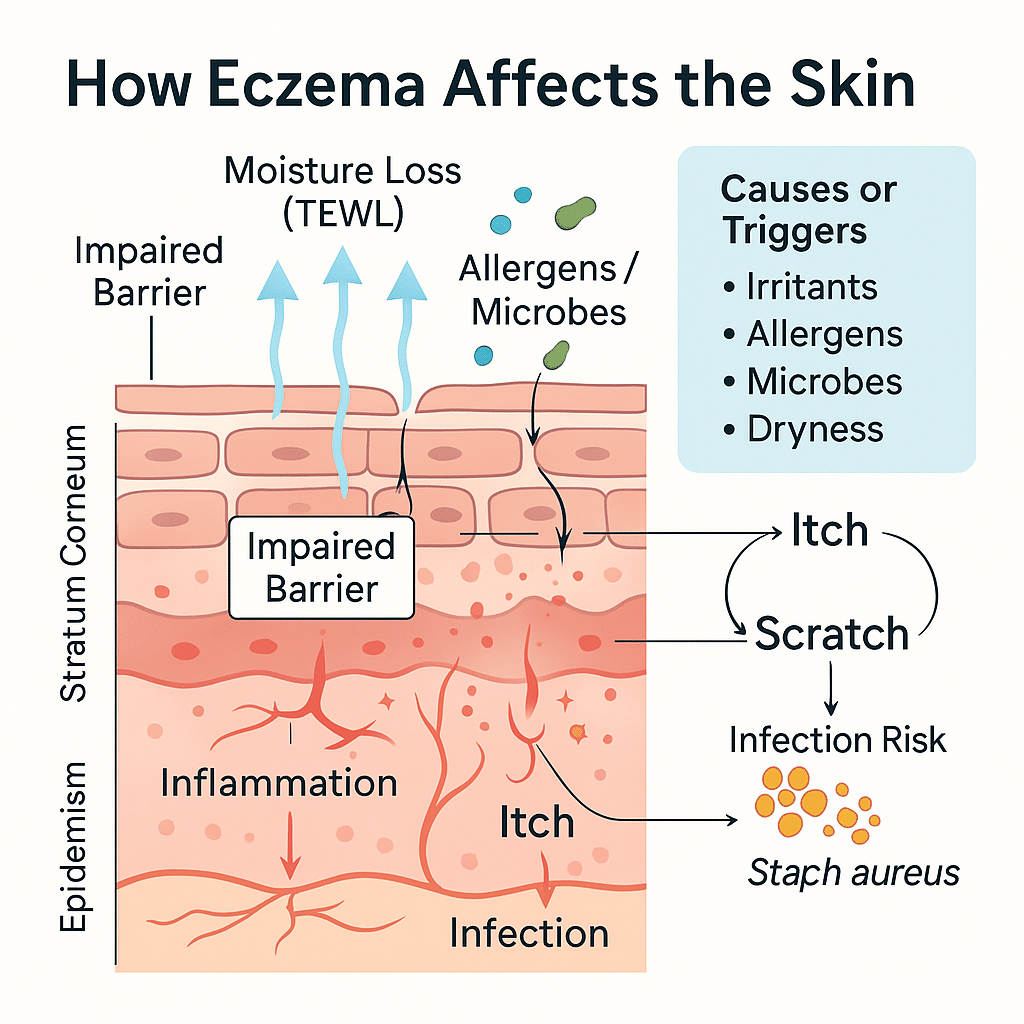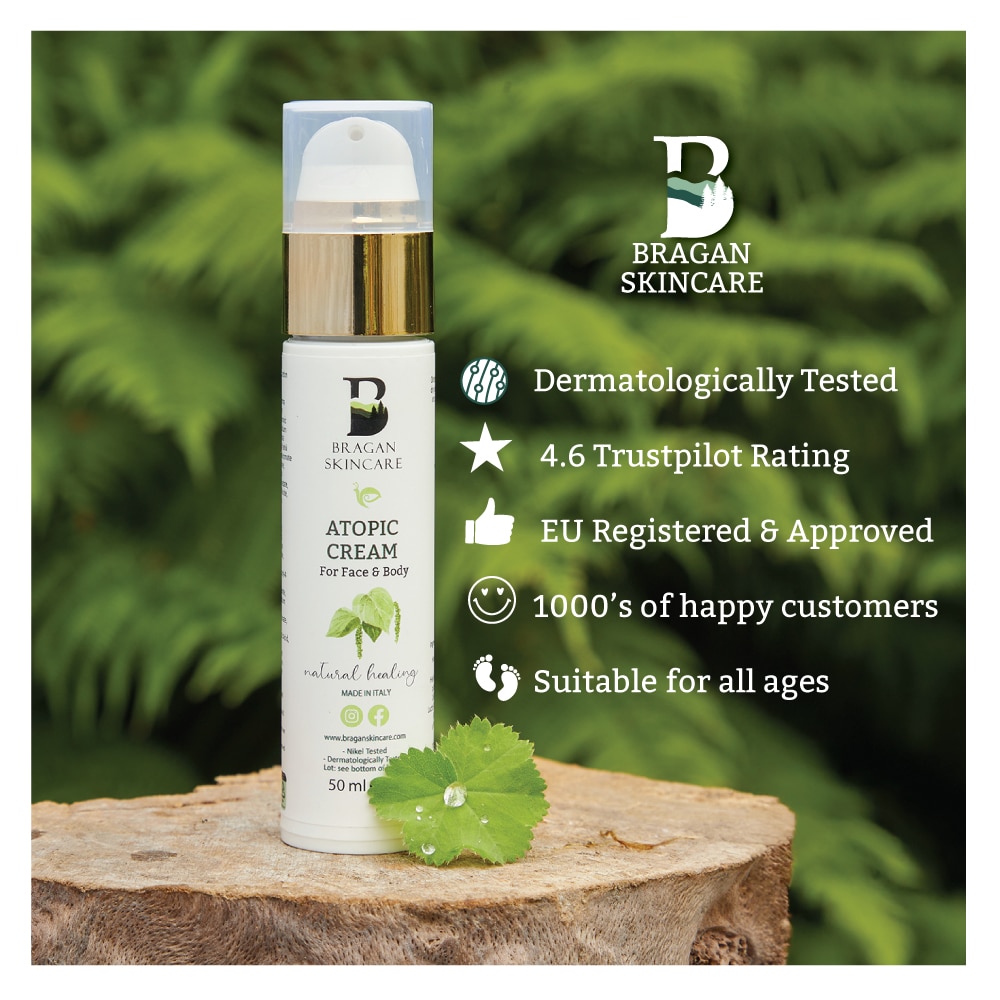How Eczema Affects the Skin: Causes, Symptoms, and Relief
Eczema is one of the most common skin conditions in the world, affecting millions of children and adults every year. While it is not dangerous, it can have a huge impact on comfort, self-esteem, and quality of life. To understand why eczema causes so much irritation, it helps to look at what’s really happening under the skin.
This blog explores how eczema affects the skin, the triggers that make it worse, the symptoms you should watch out for, and the different ways you can manage it. We’ll also look at how gentle, barrier-supporting creams can help soothe irritation and support skin repair.
This guide explains what eczema is, how it damages the skin barrier, what triggers flare-ups, and the most effective ways to manage symptoms long-term.

What is Eczema?
Eczema, also known as atopic dermatitis, is a chronic inflammatory skin condition that causes dryness, itching, redness, and irritation. It often begins in childhood but can continue or develop in adulthood.
Although the exact cause is still being researched, doctors know that eczema is linked to:
- An overactive immune system
- An impaired skin barrier
- Genetic factors (running in families)
- Environmental triggers such as allergens, irritants, or stress
When the skin barrier is weakened, it cannot retain moisture properly. This makes it easier for irritants, allergens, and microbes to penetrate, leading to inflammation and itching.
How Eczema Affects the Skin Barrier
The skin barrier is like a protective wall, keeping moisture in and harmful substances out. In eczema, this barrier becomes impaired, allowing moisture to escape and irritants to enter more easily.
Step-by-step breakdown
- Impaired barrier – Tiny gaps form in the outer layer of the skin (stratum corneum).
- Moisture loss – Water escapes through these gaps, a process known as transepidermal water loss (TEWL).
- Allergen and microbe entry – Pollen, dust, microbes, and irritants can sneak past the weakened barrier.
- Inflammation – The immune system reacts, triggering redness and swelling.
- Itch-scratch cycle – Itching leads to scratching, which further damages the skin.
- Infection risk – Open wounds make it easier for bacteria like Staphylococcus aureus to cause infection.
Common Triggers of Eczema
Not everyone reacts to the same triggers. However, some of the most common include:
- Irritants – Soaps, shampoos, detergents, and cleaning products
- Allergens – Dust mites, pollen, mould, pet dander, or certain foods
- Microbes – Bacteria, viruses, or fungi on the skin
- Dryness – Cold weather, low humidity, or hot showers that strip oils
- Stress – Emotional stress can worsen flare-ups
- Hormonal changes – Fluctuations during puberty, pregnancy, or menopause
Key takeaway: Avoiding triggers wherever possible is one of the most effective steps in eczema management.
Symptoms of Eczema
The symptoms of eczema can vary from mild to severe and may change over time. Common symptoms include:
- Dry, cracked, or scaly skin
- Itching (which can be severe at night)
- Red or inflamed patches
- Thickened skin from frequent scratching
- Clear fluid-filled blisters during flare-ups
- Dark or light patches after healing (post-inflammatory pigmentation)
In some cases, eczema may also become infected. Signs of infection include:
- Yellow crusts on the skin
- Pus or fluid
- Increased redness and swelling
- Pain or warmth in the affected area
The Itch-Scratch Cycle
One of the most frustrating aspects of eczema is the itch-scratch cycle.
- Skin becomes itchy due to dryness or inflammation.
- Scratching gives temporary relief but causes damage.
- Damaged skin becomes more inflamed, leading to even more itching.
- The cycle continues, sometimes leading to open wounds and infections.
Breaking this cycle is one of the main goals of eczema treatment, as ongoing scratching can delay healing and increase the risk of infection.
How Eczema Affects Daily Life
Eczema is more than just a skin condition—it can affect physical comfort, emotional wellbeing, and many aspects of daily life.
- Sleep problems due to nighttime itching
- Emotional distress and low confidence
- Difficulty with work or school when flare-ups are severe
- Restrictions on clothing choices, as some fabrics (like wool) may worsen irritation
Treatment Options for Eczema
While there is no cure for eczema, treatments focus on managing symptoms and preventing flare-ups.
Moisturising regularly (the foundation of eczema care)
The cornerstone of eczema care is hydration. Moisturisers restore the skin barrier and reduce dryness.
- Choose fragrance-free creams or ointments
- Apply at least twice daily
- Reapply after bathing or washing hands
Topical corticosteroids
Doctors often prescribe steroid creams to reduce inflammation during flare-ups. When used as directed and for short periods, they can be very effective, but they should always be used carefully under medical guidance.
Non-steroidal creams
Calcineurin inhibitors (such as tacrolimus) may be prescribed as an alternative to steroids, particularly for sensitive areas or when long-term treatment is needed.
Antihistamines
For severe itching, antihistamines may help reduce discomfort, especially at night, although they do not treat the underlying skin inflammation.
Lifestyle management
- Avoid hot showers
- Use gentle, fragrance-free cleansers
- Wear soft, breathable clothing
- Keep nails short to reduce damage from scratching
How Snail Mucin Helps in Eczema Care
In recent years, snail mucin has gained recognition in skincare due to its natural healing properties.
Key benefits of snail mucin for eczema-prone skin
- Hydration – Rich in hydrating compounds that help the skin retain moisture.
- Barrier repair – Supports the repair and protection of the skin barrier.
- Anti-inflammatory – Helps calm redness and irritation.
- Skin recovery – Supports the skin’s natural repair processes.
- Gentle on sensitive skin – Typically well tolerated when formulated without fragrance or harsh additives.
Bragan Skincare’s Atopic Cream – A Natural Support
At Bragan Skincare, we know how challenging eczema can be. That’s why we developed our Atopic Cream, powered by snail mucin from our own farm in Monaghan, Ireland.
Why choose Bragan Skincare’s Atopic Cream?
- Made with snail mucin, proven to hydrate and repair skin
- Fragrance-free and suitable for sensitive skin
- Gentle enough for all ages, including infants
- Helps to reduce redness, dryness, and itching
- Supports the skin’s natural healing process
Our Atopic Cream is designed to support the skin barrier, help calm irritation, and provide comfort as part of a daily eczema care routine.
👉 Many of our customers use it as part of their daily eczema care routine to keep flare-ups under control.

Tips for Managing Eczema at Home
Alongside creams and treatments, small lifestyle changes can make a big difference.
- Keep skin moisturised – Apply creams right after bathing.
- Avoid scratching – Try patting or cooling the skin instead.
- Use lukewarm water – Hot water strips natural oils.
- Humidify your home – Helps prevent dryness in winter.
- Stay cool – Heat and sweat can trigger flare-ups.
- Choose cotton fabrics – Soft and breathable for sensitive skin.
Living Well with Eczema
Eczema can be a lifelong condition, but with the right care, flare-ups can be reduced. The key is consistency—protecting your skin barrier every day and acting quickly at the first sign of irritation.
Remember:
- Moisturise regularly
- Avoid triggers
- Treat flare-ups early
- Support skin healing with gentle, nourishing creams
Frequently Asked Questions (FAQs)
Can eczema be cured?
There is no cure, but many people manage symptoms effectively with the right skincare and lifestyle adjustments.
Is eczema contagious?
No. Eczema is not an infection and cannot be passed from person to person.
Can diet affect eczema?
Yes. Some people notice flare-ups after eating foods such as dairy, eggs, or nuts. Keeping a food diary may help identify triggers.
Is snail mucin safe for eczema?
Snail mucin is generally well tolerated and known for its hydrating and soothing properties, which may benefit sensitive, eczema-prone skin when used in gentle, fragrance-free formulations.
Can children use Bragan Skincare’s Atopic Cream?
Yes. Our cream is fragrance-free, gentle, and safe for all ages, including infants.
Final Thoughts
Eczema can be frustrating, but understanding how it affects the skin is the first step toward managing it. By recognising triggers, breaking the itch-scratch cycle, and supporting your skin barrier with nourishing treatments, you can greatly reduce discomfort.
If you’re looking for a gentle, natural option, Bragan Skincare’s Atopic Cream with snail mucin is here to help. It restores hydration, reduces inflammation, and supports the skin’s healing process—so you can feel comfortable and confident again.
Featured Bragan Skincare Products
-
€39.99 – €100.00Price range: €39.99 through €100.00Select options This product has multiple variants. The options may be chosen on the product page
-
€100.00Select options This product has multiple variants. The options may be chosen on the product page
